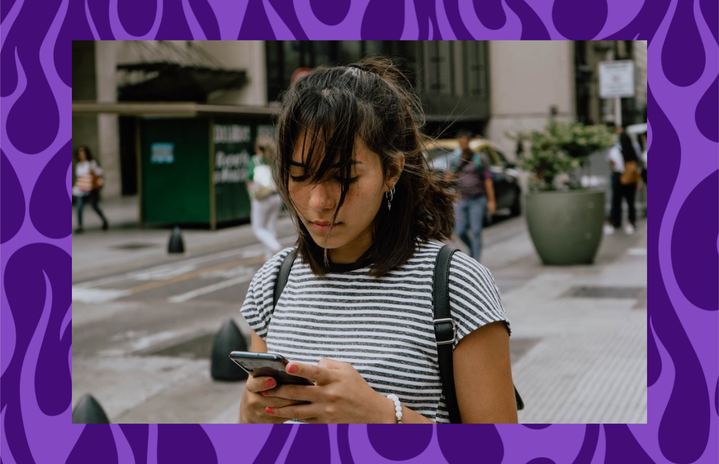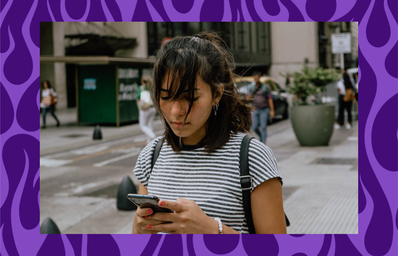TikTok has become the go-to app for people to overshare, whether it be a funny or traumatizing personal story. There are probably hundreds, if not thousands, of creators who have built their platforms off of oversharing things about their lives, from Kirsten Titus to Bryanthediamond. However, a new form of oversharing has taken over For You pages everywhere lately: trauma dumping by creators on their audience.
Saba Lurie, a licensed marriage and family therapist, tells Her Campus, “Trauma dumping is the act of unloading one’s experience of trauma onto an unsuspecting individual or audience, either in person or via social media.” Unlike venting, trauma dumping is done unto an unsuspecting individual. While sharing your trauma isn’t wrong in and of itself, the problem is that the information is shared without consent, in an unsuitable time or place and to a person who may not be in the right mental headspace to receive the information.
Why do we feel an urge to trauma dump?
Trauma dumping might seem cathartic for the person doing it, but can have effects on others beyond them. Elizabeth Power, who teaches Trauma Informed Medical Care at Georgetown University Medical Center, tells Her Campus, “Fifteen seconds of trauma dumping is often a way of purging the powerful, strong feelings that surround trauma and recovery — it’s a steam valve that leaks on everyone.”
Dr. Paige E. Roberts, a licensed clinical social worker, tells Her Campus that when people experience trauma, it activates the sympathetic nervous system, which triggers our fight, flight, or freeze response, and this causes individuals to become hyper-vigilant. “When we are in this mental state, we tend to want to pull others into this uncomfortable feeling in an attempt to get the experience out of our nervous system,” Dr. Roberts says. “It can be like we want empathy and understanding or we just want to bring someone into our experience as a resource so we are not alone in this experience … They can share some of the burden.”
Such a feeling can cause us to overshare with anyone who allows us any space or permission to express ourselves. Additionally, when we are in such a sympathetic state, the body has an abundance of cortisol that may cause some low-grade inflammation within the brain. This inflammation can occur within the temporal lobe, which is the part of the brain that filters information, so individuals may tend to overshare because they do not have the awareness of how the information will be received by the listener.
How does trauma dumping impact the sharer?
Trauma dumping may have positive outcomes for the person sharing if the listener responds supportively, according to Lurie, and it may connect the person sharing to resources like therapy that may help them to better process and understand their trauma.
Unfortunately, trauma dumping may also be harmful to the person sharing, especially on platforms with large audiences like TikTok. Anonymity allows social media users to unnecessarily voice their cruel and hateful opinions. Lurie adds, “I would encourage folks to be thoughtful about why they’re seeking to share their trauma in this way. It’s important to seek support and validation and to also normalize living through trauma, but people should take care to protect themselves from the negative aspects of social media and the potential emotional harm that they could face.”
What about the listeners?
The receiver may experience either positive or negative outcomes. According to Lurie, “Vicarious trauma can occur when a person hears or reads about someone else’s experience of trauma and for highly sensitive people or individuals who are especially empathetic, trauma dumping can be very destabilizing. On the other hand, some people might be heartened and validated by learning about someone else’s experience of trauma, particularly if they are a survivor of trauma themselves.”
It may be helpful for some to learn how others process and work through their trauma to feel less alone and to gain guidance and clarity regarding how they might navigate their own experiences. However, Lurie recommends that people attempt to stay conscious of what they are hoping to gain from engaging with such content on social media and the potential harm it may cause.
Power also explains that trauma dumping is disrespectful to both individuals, and it is difficult to build a solid relationship off of trauma. “That’s a deeply personal experience that should be shared with people with whom you are deeply connected,” she says. “It shows that you have no concern for the impact of your story on others, which is like the lack of concern you perceive the traumatizing circumstance had for you. It disallows our developing a relationship sturdy enough to support each and both of our stories.”
TikTok can lull us into a false sense of security.
Licensed clinical social worker Lena Suarez-Angelino tells Her Campus that people feel comfortable to trauma dump on social media platforms like TikTok because of something referred to as a trauma bond — the sense of fostering comfort and connection as a result of shared trauma experiences. “Trauma dumping is common on TikTok because the person sharing may feel that they have already exhausted their support and feel like a burden continuing to share and trauma dump on them,” says Suarez-Angelino.
People have a desire to be heard, which results in trauma dumping on TikTok, according to relationship coach Steffo Shambo. Since not everyone feels comfortable talking to the people who surround them, TikTok provides a chance to interact and befriend people from around the world, making it convenient to share anything you desire without a fear of judgment. Such a pure intention, though, may not receive the desired outcome, as judgmental comments and internet trolls can cause an individual to doubt their decisions. Shambo tells Her Campus, “Victim blaming is also prevalent, which discourages people from opening up about their past trauma on a platform that is rapidly commercialized by influencers.”
There are healthier ways to work through trauma.
According to licensed therapist Molly Zive, it is vital to weigh the risks and benefits of both sharing and listening to trauma on TikTok. “In communities where individuals feel marginalized, social media can be a way of connecting with others,” she tells Her Campus. “I wouldn’t recommend sharing trauma on TikTok. If you feel like you need to process trauma, I would highly recommend reaching out to a licensed mental health professional.”
If you or someone you know is struggling with past trauma, there are resources to help. Therapy is a great option to receive professional help, and despite popular belief, there are affordable therapy options available to college students. If you find yourself specifically struggling with trauma dumping on TikTok or other social media apps, giving up TikTok may also help you to separate yourself from the urge to trauma dump online.
If you or someone you know is seeking help for mental health concerns, visit the National Alliance on Mental Illness (NAMI) website, or call 1-800-950-NAMI(6264). For confidential treatment referrals, visit the Substance Abuse and Mental Health Services Administration (SAMHSA) website, or call the National Helpline at 1-800-662-HELP(4357). In an emergency, contact the National Suicide Prevention Lifeline at 1-800-273-TALK(8255) or call 911.


